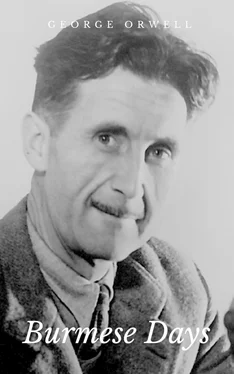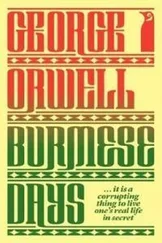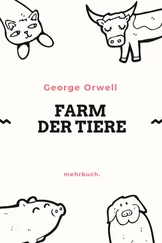All these were secondary expressions, however. The first thing that one noticed in Flory was a hideous birthmark stretching in a ragged crescent down his left cheek, from the eye to the corner of the mouth. Seen from the left side his face had a battered, woe-begone look, as though the birthmark had been a bruise—for it was a dark blue in colour. He was quite aware of its hideousness. And at all times, when he was not alone, there was a sidelongness about his movements, as he manoeuvred constantly to keep the birthmark out of sight.
Flory’s house was at the top of the maidan, close to the edge of the jungle. From the gate the maidan sloped sharply down, scorched and khaki-coloured, with half a dozen dazzling white bungalows scattered round it. All quaked, shivered in the hot air. There was an English cemetery within a white wall half-way down the hill, and near by a tiny tin-roofed church. Beyond that was the European Club, and when one looked at the Club—a dumpy one-storey wooden building—one looked at the real centre of the town. In any town in India the European Club is the spiritual citadel, the real seat of the British power, the Nirvana for which native officials and millionaires pine in vain. It was doubly so in this case, for it was the proud boast of Kyauktada Club that, almost alone of Clubs in Burma, it had never admitted an Oriental to membership. Beyond the Club, the Irrawaddy flowed huge and ochreous, glittering like diamonds in the patches that caught the sun; and beyond the river stretched great wastes of paddy fields, ending at the horizon in a range of blackish hills.
The native town, and the courts and the jail, were over to the right, mostly hidden in green groves of peepul trees. The spire of the pagoda rose from the trees like a slender spear tipped with gold. Kyauktada was a fairly typical Upper Burma town, that had not changed greatly between the days of Marco Polo and the Second Burma War, and might have slept in the Middle Ages for a century more if it had not proved a convenient spot for a railway terminus. In 1910 the Government made it the headquarters of a district and a seat of Progress—interpretable as a block of law-courts, with their army of fat but ravenous pleaders, a hospital, a school and one of those huge, durable jails which the English have built everywhere between Gibraltar and Hong Kong. The population was about four thousand, including a couple of hundred Indians, a few score Chinese, and seven Europeans. There were also two Eurasians named Mr Francis and Mr Samuel, the sons of an American Baptist missionary and a Roman Catholic missionary respectively. The town contained no curiosities of any kind, except an Indian fakir who had lived for twenty years in a tree near the bazaar, drawing his food up in a basket every morning.
Flory yawned as he came out of the gate. He had been half drunk the night before, and the glare made him feel liverish. ‘Bloody, bloody hole!’ he thought, looking down the hill. And, no one except the dog being near, he began to sing aloud ‘Bloody, bloody, bloody, oh, how thou art bloody’ to the tune of ‘Holy, holy, holy, oh how Thou art holy’, as he walked down the hot red road, switching at the dried-up grasses with his stick. It was nearly nine o’clock and the sun was fiercer every minute. The heat throbbed down on one’s head with a steady, rhythmic thumping like blows from an enormous bolster. Flory stopped at the Club gate, wondering whether to go in or to go further down the road and see Dr Veraswami. Then he remembered that it was ‘English mail day’ and the newspapers would have arrived. He went in, past the big tennis screen, which was overgrown by a creeper with starlike mauve flowers.
In the borders beside the path swaths of English flowers—phlox and larkspur, hollyhock and petunia—not yet slain by the sun, rioted in vast size and richness. The petunias were huge, like trees almost. There was no lawn, but instead a shrubbery of native trees and bushes—gold mohur trees like vast umbrellas of blood-red bloom, frangipanis with creamy, stalkless flowers, purple bougainvillea, scarlet hibiscus and the pink Chinese rose, bilious-green crotons, feathery fronds of tamarind. The clash of colours hurt one’s eyes in the glare. A nearly naked mali, watering-can in hand, was moving in the jungle of flowers like some large nectar-sucking bird.
On the Club steps a sandy-haired Englishman, with a prickly moustache, pale grey eyes too far apart, and abnormally thin calves to his legs, was standing with his hands in the pockets of his shorts. This was Mr Westfield, the District Superintendent of Police. With a very bored air he was rocking himself backwards and forwards on his heels and pouting his upper lip so that his moustache tickled his nose. He greeted Flory with a slight sideways movement of his head. His way of speaking was clipped and soldierly, missing out every word that well could be missed out. Nearly everything he said was intended for a joke, but the tone of his voice was hollow and melancholy.
‘Hullo, Flory me lad. Bloody awful morning, what?’
‘We must expect it at this time of year, I suppose,’ Flory said. He had turned himself a little sideways, so that his birthmarked cheek was away from Westfield.
‘Yes, dammit. Couple of months of this coming. Last year we didn’t have a spot of rain till June. Look at that bloody sky, not a cloud in it. Like one of those damned great blue enamel saucepans. God! What’d you give to be in Piccadilly now, eh?’
‘Have the English papers come?’
‘Yes. Dear old Punch, Pink’un and Vie Parisienne. Makes you homesick to read ’em, what? Let’s come in and have a drink before the ice all goes. Old Lackersteen’s been fairly bathing in it. Half pickled already.’
They went in, Westfield remarking in his gloomy voice, ‘Lead on, Macduff.’ Inside, the Club was a teak-walled place smelling of earth-oil, and consisting of only four rooms, one of which contained a forlorn ‘library’ of five hundred mildewed novels, and another an old and mangy billiard-table—this, however, seldom used, for during most of the year hordes of flying beetles came buzzing round the lamps and littered themselves over the cloth. There were also a card-room and a ‘lounge’ which looked towards the river, over a wide veranda; but at this time of day all the verandas were curtained with green bamboo chicks. The lounge was an unhomelike room, with coco-nut matting on the floor, and wicker chairs and tables which were littered with shiny illustrated papers. For ornament there were a number of ‘Bonzo’ pictures, and the dusty skulls of sambhur. A punkah, lazily flapping, shook dust into the tepid air.
There were three men in the room. Under the punkah a florid, fine-looking, slightly bloated man of forty was sprawling across the table with his head in his hands, groaning in pain. This was Mr Lackersteen, the local manager of a timber firm. He had been badly drunk the night before, and he was suffering for it. Ellis, local manager of yet another company, was standing before the notice-board studying some notice with a look of bitter concentration. He was a tiny wiry-haired fellow with a pale sharp-featured face and restless movements. Maxwell, the acting Divisional Forest Officer, was lying in one of the long chairs reading the Field, and invisible except for two large-boned legs and thick downy forearms.
‘Look at this naughty old man,’ said Westfield, taking Mr Lackersteen half affectionately by the shoulders and shaking him. ‘Example to the young, what? There but for the grace of God and all that. Gives you an idea what you’ll be like at forty.’
Mr Lackersteen gave a groan which sounded like ‘brandy’.
‘Poor old chap,’ said Westfield; ‘regular martyr to booze, eh? Look at it oozing out of his pores. Reminds me of the old colonel who used to sleep without a mosquito net. They asked his servant why and the servant said: “At night, master too drunk to notice mosquitoes; in the morning, mosquitoes too drunk to notice master.” Look at him—boozed last night and then asking for more. Got a little niece coming to stay with him, too. Due tonight, isn’t she, Lackersteen?’
Читать дальше











